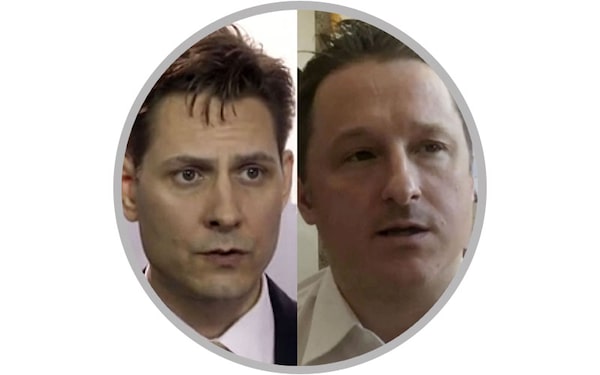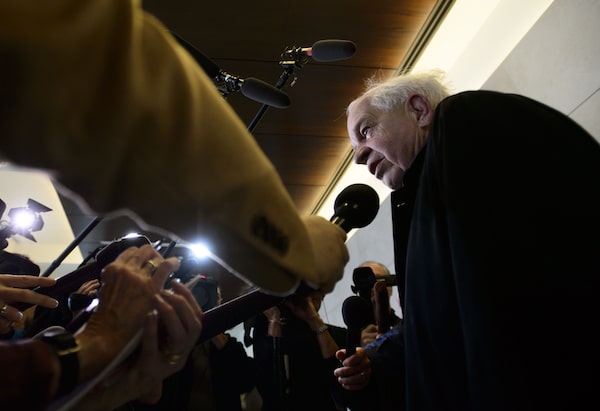The latest
- Meng Wanzhou’s lawyers say at least part of their defence strategy will be on similar lines to those raised by ousted ambassador John McCallum: Arguing that U.S. political motives are behind her arrest, and that she didn’t do anything criminal under Canadian law.
- Mr. McCallum’s exit was announced on Jan. 26, four days after he voiced personal opinions to Chinese-language media about Canada’s detention of Ms. Meng, an executive at Chinese telecom firm Huawei. Mr. McCallum suggested she might have “quite good arguments” to avoid extradition to the United States on fraud charges, though he later apologized for wading into the legal case.
- Two weeks before he was fired, McCallum made similar comments in private to business leaders, The Globe and Mail reported. Opposition critics and an ex-diplomat suggested his views on the Huawei executive were not an off-script outburst, but part of a consistent message they think must have had some official approval. But when Foreign Affairs Minister Chrystia Freeland explained the firing on Jan. 28, she said it was because he contradicted the government. “The central job of an ambassador is to represent accurately the government’s position. John didn’t do that and that is why his position was untenable,” Ms. Freeland said.
- For now, veteran diplomat Jim Nickel has taken over Mr. McCallum’s duties as ambassador, including efforts to free Michael Kovrig and Michael Spavor, two Canadians who were detained in China in apparent retaliation for Ms. Meng’s arrest.
Who’s who

John McCallum: A veteran cabinet minister under the Liberal governments of the Chrétien-Martin era, Mr. McCallum brought a rich political pedigree – but not experience as a career diplomat – to the China ambassadorship when Prime Minister Justin Trudeau gave him the post in 2017. The 68-year-old inherited a messy period in Canada-China relations, complicated by U.S. President Donald Trump’s trade war with Beijing. But on Jan. 26, he was fired by Mr. Trudeau after a furor over his remarks about Ms. Meng’s detention.
Profile: Who was John McCallum and what was his strategy?

Meng Wanzhou: The chief financial officer of Huawei was arrested in Canada on Dec. 1 on behalf of U.S. prosecutors, who accuse her of lying to American financial institutions to do business in Iran despite U.S. sanctions on that country. The U.S. Justice Department has also indicted Huawei itself and some subsidiaries, accusing them of obstruction of justice, bank fraud, money laundering and other offences. The Americans have officially asked Canada to extradite Ms. Meng, who denies the allegations against her. Until her extradition case is heard, she is free on bail, but ordered to stay in the Vancouver area.
Explainer: Meng Wanzhou, Huawei and the story so far

Michael Kovrig and Michael Spavor: Two Canadians, an ex-diplomat and an entrepreneur, respectively, were detained on Dec. 10 in China and accused of endangering national security. The detentions, and other actions targeting Canadians in China, were an apparent retaliation for Ms. Meng’s arrest. Mr. McCallum had consular access to both men and was key to the Canadian effort to secure their release.
Explainer: A who's who of the Canadians detained in China
Jim Nickel: Mr. McCallum’s replacement as Canada’s interim ambassador to China is a career diplomat who joined the foreign service in 1991. The 59-year-old Saskatchewan native has served in posts across Asia over the decades, most recently in Beijing, where he was the deputy head of mission.
Background: The new ‘steady hand at the tiller’ in Beijing
What McCallum said

Jan. 18, 2019: John McCallum arrives to brief members of the Foreign Affairs committee in Ottawa, four days before his controversial news conference in Markham, Ont.Sean Kilpatrick/The Canadian Press
JAN. 22: ‘STRONG ARGUMENTS’
Mr. McCallum’s troubles started on Jan. 22 at a news conference in Markham, Ont., with Chinese-language media. There, he offered a personal opinion on Ms. Meng’s extradition, suggesting that she might be able to persuade a Canadian court that the U.S. case against her was politically motivated and that she should not be extradited there:
I think she has quite good arguments on her side. One, political involvement by comments from Donald Trump in her case. Two, there’s an extraterritorial aspect to her case, and three, there’s the issue of Iran sanctions, which are involved in her case, and Canada does not sign on to these Iran sanctions. So I think she has some strong arguments that she can make before a judge.
The Trump remarks he was referring to were from December, when the U.S. President told Reuters news agency he might intervene in the Meng case if it would help secure a Sino-American trade deal. Mr. McCallum went on to suggest a deal between Washington and Beijing could bring Ms. Meng back to China in exchange for the release of Mr. Spavor and Mr. Kovrig, the two Canadians detained in China:
And part of the deal would be that they would no longer seek her extradition. And we would hope if the U.S. made such a deal, part of the deal would be also to release the two Canadians. So that is an option, but that is more under the control of the United States.
JAN. 24: THE APOLOGY
Mr. McCallum’s news conference drew condemnation from former Canadian diplomats and opposition-party leaders who called for him to be fired, though the Prime Minister continued to defend him. On Jan. 24, Mr. McCallum apologized and said he had misspoken:
I regret that my comments with respect to the legal proceedings of Ms. Meng have created confusion. I misspoke. These comments do not accurately represent my position on this issue.
JAN. 26: EXIT MCCALLUM
justin trudeau

Jan. 25: Prime Minister Justin Trudeau, left, speaks at a Liberal candidate's nomination meeting in Quebec City.Jacques Boissinot/The Canadian Press
On Jan. 26, Mr. Trudeau issued a brief statement announcing Mr. McCallum would be leaving his post, but did not explain why:
Last night I asked for and accepted John McCallum’s resignation as Canada’s Ambassador to China.
For almost two decades, John McCallum has served Canadians honourably and with distinction. He held many positions in Cabinet over the years, including Minister of National Defence, Minister of Veterans Affairs and, most recently, Minister of Immigration, Refugees and Citizenship. His work as Minister of Immigration, Refugees and Citizenship in bringing in over 39,500 Syrian refugees remains an inspiration to Canadians and an example to the world. I thank him and his family for his service over the past many years.
Effective immediately and in keeping with standard practice, Jim Nickel, the Deputy Head of Mission at the Embassy of Canada in Beijing, will represent Canada in China as Chargé d’affaires.
China’s reaction
China’s foreign ministry and state media, who have portrayed the case against Ms. Meng as a political smear campaign against China’s flagship telecom company, initially welcomed Mr. McCallum’s Jan. 22 remarks as supportive of their cause. His firing was angrily condemned in an editorial in the state-run China Daily newspaper:
McCallum was merely stating the truth when he observed that Meng has a strong case against extradition, which he rightly said was politically motivated. Although what he said is 100 per cent true, his words seem to have fallen on deaf ears at home. Those who had attacked McCallum should feel ashamed of themselves... the political mess that Ottawa is floundering in could get a lot worse if it chooses to accede to the U.S. request for Meng’s extradition despite the problems with the case that McCallum, among others, has pointed out.
Uproar in Ottawa

The Peace Tower is seen through the iron gates of Parliament Hill in Ottawa.Sean Kilpatrick/The Canadian Press
With an election coming up this fall, Conservative Party Leader Andrew Scheer has been denouncing the McCallum affair in campaign-style speeches, saying Mr. Trudeau should have fired the ambassador sooner and that Canadians are fed up with the Liberals' approach to diplomacy. Mr. Trudeau was expected to face harsh questions on the issue on Jan. 28, when the House of Commons is back in session.
Within the Liberals' ranks, Mr. McCallum’s firing has upset some of Mr. McCallum’s former colleagues who say he was only being honest about the U.S. role in the Meng case. Herb Dhaliwal, a former cabinet minister who served with Mr. McCallum in the Chrétien government, said his firing and the Meng case has set back Sino-Canadian relations:
I think it was a big mistake, you know, Chrétien worked very hard to build the Canada-China relationship and they have destroyed it in a very short period.
What does all this mean for Ms. Meng?
Dec. 11, 2018: Robert Long holds a sign outside the B.C. Supreme Court bail hearing of Huawei CFO Meng Wanzhou.Lindsey Wasson/Reuters
It remains to be seen whether, as Mr. McCallum suggests, the politics behind Ms. Meng’s case could influence its legal outcome. Her lawyers apparently believe it might: In an interview with The Globe, her lead counsel, Richard Peck, said Mr. McCallum had touched on one of the case’s key issues. “The political overlay of this case is remarkable," Mr. Peck said. "That’s probably the one thing that sets it apart from any other extradition case I’ve ever seen. It’s got this cloud of politicization hanging over it.”
But there are some important steps that need to be taken before Ms. Meng’s lawyers can make their case, and even more before her fate is decided. Here’s what to expect next:
Getting to a hearing: U.S. prosecutors sent their official extradition request to Canada’s Justice Department on Jan. 29. Once a request is made, the department’s International Assistance Group has 30 days to decide whether the request is lawful under Canada’s extradition treaty with the United States. If it is, they give what’s called an “authority to proceed” that authorizes an extradition hearing.
At the hearing: Canadian courts generally grant extradition requests to the United States, Globe justice writer Sean Fine explains: Over the past decade, there have been some 1,269 requests, and only 395 weren’t surrendered. But “conduct by the requesting state that amounts to an abuse of process is a basis for the extradition court to refuse extradition,” Edmonton lawyer Nathan Whitling says. Politically-motivated charges could constitute such an abuse of process, and there is precedent to support that, but the challenge for Ms. Meng’s defence is to prove that to a judge.
The final call: Ultimately, extradition decisions are up to the attorney-general. The current one, David Lametti, was appointed only about a week before the McCallum controversy erupted. Under the Extradition Act, the attorney-general “shall refuse” to hand over a suspect if doing so would be “unjust and oppressive” in all the circumstances. And if he says yes to the extradition, Ms. Meng can apply for a judicial review in a provincial appeal court.
Outcomes in the U.S.: If Ms. Meng is extradited, tried in a U.S. court and found guilty, the bank-fraud charges she faces could lead to a maximum 30-year prison sentence.
Analysis and commentary
Campbell Clark: Trudeau’s response to McCallum is another example of amateur-hour bumbling
John Higginbotham: Don’t blame John McCallum for Canada’s current China mess
Compiled by Globe staff
With reports from Nathan VanderKlippe, Robert Fife, Steven Chase, Bill Curry and Sean Fine